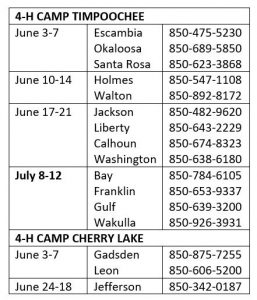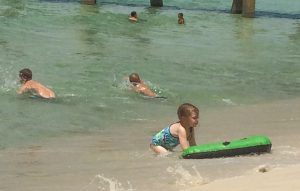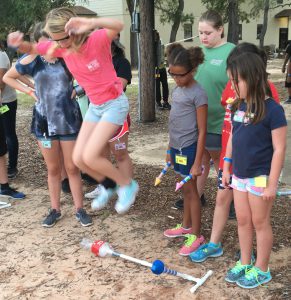by Melanie Taylor | May 1, 2019

Making friends at 4-H Camp in the early 1990’s (Melanie Taylor, Gulf County 4-H Agent, on right)
4-H Summer Camp preparations are in full swing all over the state. As a 4-H agent preparing for our week of county 4-H camp, my days are busy with phone calls and emails from parents, teen counselor training, adult volunteer screenings, paperwork, paperwork and more paperwork. Although it’s busy time for me as a 4-H agent, it also allows me to reflect why I chose this career path and why there is a sense of nostalgia as I prepare for 4-H camp.
Camp Memories
I grew up in Virginia and attended 4-H camp every year from age 9-18. I was a camper that grew into a counselor-in-training and then a full-fledged counselor. Those weeks of 4-H camp were filled with hot days and warm nights, but it was worth it all for the memories I’ll have for a lifetime. I can still smell the cafeteria food and hear the sounds in the gymnasium as kids played basketball and pounded at their leather-craft projects. I still get the chills when I think about our entire camp singing around the campfire circle and patiently waiting for a canoe, filled with camp staff, to land on the lakes edge. The staff would enter the campfire circle carrying the flame and ceremoniously light the fire. I’m still connected with my 4-H camp friends through social media and/or as close friends, and we continue to share our old, blurry camp pictures from the 1990’s each year on Facebook.

Memories to Last a Lifetime…
This is why I work hard to prepare camp for my county campers and teen counselors – I want to create similar memories for them. In 10, 20 or 30 years from now, I want them to think back on the fun moments they experienced in the Florida 4-H camping program. I want them to form friendships and make camp connections for a lifetime, whether it’s learning to kayak, fish, making arts and crafts, cooking over a campfire, singing camp songs and much more.
With all of this said, I hope you as parents will consider giving your child(ren) these special moments. The days are long, but fun, and nights are filled with campfires and hanging out with friends. When they arrive home on Friday, they’ll be exhausted but so excited to share all of the camp songs with you (prepare yourself for lots of loud, enthusiastic singing). They’ll have new friends they want you to meet and tell you camp stories they’ll always cherish.
When is Your County Camping?
In northwest Florida, there are two 4-H Camps:
4-H Camp Timpoochee in Niceville and 4-H Camp Cherry Lake in Madison.
Each county in these camping districts has one week of camp each summer.  Contact your local UF/IFAS Extension Office now
Contact your local UF/IFAS Extension Office now
to find out the details and register your child for a week of fun and memories!
by Melanie Taylor | Jan 11, 2019

Be mindful and enjoy the moment.
Now that the busy holiday season is over, it’s a time to reflect on the past but prepare and refocus for the new year ahead. As we focus on the new year, it is always refreshing to have a clean slate. As the year begins to unfold, there are tips to help you manage your day-to-day stress levels. It begins with mindfulness.
What is mindfulness?
Mindfulness means paying attention in a particular way; on purpose, in the present moment, and non-judgmentally.” Dr. Jon Kabat-Zinn (1991)
Mindfulness is best thought of as a way of being rather than an activity Almost any activity can be carried out with mindful awareness.
Three Key Features of Mindful Awareness:
- Purpose – intentionally and purposefully directing your attention rather than letting it wander.
- Presence – being fully engaged with and attentive to the present moment. Thoughts about the past and future that arise are recognized simply as thoughts occurring in the present.
- Acceptance – being non-judgmental toward whatever arises in the moment. This means that sensations, thoughts, and emotions are not judged as good or bad, pleasant or unpleasant; they are simply noticed as “happening” and observed until they eventually pass (Naik, Harris and Forthun 2016).
Mindfulness is a mind-body practice that has been found to benefit both psychological and physical health. The primary psychological change that occurs during mindfulness practice is an increased awareness of thoughts, feelings, and sensations in the present moment. Over time, mindfulness practice can help you to become aware of the space between noticing experiences and reacting to them by letting you slow down and observe the processes of your mind (Black 2010).
The ultimate goal of mindfulness practice is for you to take advantage of this space so you can make more intentional decisions – to wake up from living life on autopilot, based on unproductive habits of mind
(Black 2010; Walach et al. 2007).
According to the American Psychological Association, some empirically supported benefits of mindfulness include the following (Davis & Hayes 2011):
Psychological Benefits
- Increased awareness of one’s mind
- Significantly reduced stress, anxiety, and negative emotions
- Increased control over ruminative thinking (a major cause and symptom of depression and anxiety)
- Increased mental flexibility and focus
- More working memory
- Decreased distracting thoughts
- Decreased emotional reactivity
- Increased capacity for intentional, responsive behaviors
- Increased empathy, compassion and conscientiousness of other’s emotions
Physiological Benefits
- Enhanced immune system functioning
- Increased brain density and neural integration in areas responsible for positive emotions, self-regulation, and long-term planning
- Lowered blood pressure
- Lowered levels of blood cortisol (a major stress hormone)
- Greater resistance to stress-related illnesses such as heart disease
Spiritual Benefits
- Increased self-insight and self-acceptance
- Increased acceptance of others
- Increased compassion and empathy
- Increased sense of morality, intuition, and courage to change
- Increased control over automatic behaviors
- Increased self-discipline
The question is, how many of us would like to benefit from mindfulness if it provides these positive benefits? All of us should strive to lower our stress level and enjoy our daily lives with a more positive attitude and more attentiveness. So, how can we incorporate this into our lives? The majority of this practice is about familiarizing yourself with what it feels like to be mindful, and getting better at “remembering” to maintain mindful awareness.
Experiment with creating your own mindfulness practices throughout your day. Being mindful of the sensation on the soles of your feet as you walk to your car or the taste and texture of your morning coffee can transform routine moments into deeply satisfying practices. However, having a ritualized and structured practice can be beneficial. To find out more about practicing mindfulness and how to incorporate a more structured practice in your life visit read Mindfulness: An Introduction.
Sources: Mindfulness: An Introduction. 2013, 2016. Retrieved from the UF/IFAS Extension Electronic Data Information System: https://edis.ifas.ufl.edu/fy1381. Publication #FCS2335
by Melanie Taylor | Dec 14, 2018

Aim to find JOY in this holiday season.
As the holiday season quickly approaches, many people are filled with extra holiday cheer and enthusiasm. Some are jolly but still overwhelmed with all of the activities, decorating, and shopping that needs to be completed. Then, there are those that find the holiday season as a reminder of things such as the death of a loved one, family feuds, divorce…the list goes on. If you are feeling this way, here are a few tips to make getting through the season a little bit easier.
- Feel your emotions – Many people want to suppress their sadness or anxiety, but this only makes it worse. We are all allowed to grieve, cry and feel mad at times. If you feel this way, let yourself feel your feelings. You will feel better once you have accepted and worked through the emotions. You also do not have to force yourself to feel happy just because it is the holiday season.
- Reach out to others – Instead of secluding yourself, spend time with others whether it’s at church, a community group or with family and friends. Spending time with others and socializing is good for the spirit.
- Volunteer – There are tons of volunteer opportunities during the holidays. Try something new and volunteer your time to a worthy cause. You’ll feel great about helping others and contributing to a cause.A national survey commissioned by UnitedHealth Group talked to 3,351 adults and found the majority of participants reported feeling mentally and physically healthier after a volunteer experience.
The research showed:
* 96% reported volunteering enriched their sense of purpose in life
* 94% of people said volunteering improved their mood
* 80% of them feel like they have control over their health
* 78% of them said volunteering lowered their stress levels
* 76% of people said volunteering has made them feel healthier
* About a quarter reported their volunteer work helped them manage a chronic illness by keeping them
active and taking their minds off of their own problems
* Volunteering improved their mood and self-esteem
- Be realistic – Realize that times and traditions change as families grow and age. Do not focus on things having to be the same every year. Be willing to accept changes, such as adult children may not be able to attend the family gathering, so utilize technology and talk through video conferencing, share pictures on email and/or Facebook. Find a way to make it work.
- Set aside differences for everyone’s sake. Aim to accept family and friends the way they are, even if they do not meet your expectations. Leave grievances at the door for the day and enjoy your family and friends. Share those grievances and talk at a more appropriate and private time. Also, remember they could be feeling the stress of the holiday too. So, be patient if someone is grouchy or sad as you celebrate. You may both be feeling the same way.
- Learn to say no – Be realistic in the number of activities you and your family can participate. Do not feel guilty because you cannot attend every party and event you are invited too. Graciously decline an invite and share that your schedule is booked, but thank them for thinking of you. A host does not expect that everyone will attend their parties.
- Take a breather as needed – If you start to feel overwhelmed with anxiety, anger or sadness take a few minutes to be alone. Take 15 minutes to spend in the quiet to reduce the stress and clear your mind. For example: listen to soothing music, do a few mindful breathing exercises to slow yourself down or read a book to temporarily escape the stress.
- Seek professional help as needed – there are times when the emotions are just too overwhelming to sort through on our own. If you continue to feel sad, anxious, angry, etc. there is absolutely no shame in seeking the help of a doctor or mental health professional. It will only help you work through your feelings with a non-bias person. Helping yourself feel better will improve your quality of life and those around you.
Learn to take care of yourself first. Learn your limitations and accept them. Don’t t let other’s expectations overwhelm you. Just remember when you start feeling extreme levels of emotions and/or stress, take a few deep breathes and remind yourself to relax and feel the moment. Be mindful of your surroundings and remind yourself of your many blessings even when going through difficult times. Make it your personal goal to feel your feelings and enjoy what you can about the holiday season whether it is the twinkling lights, time with friends and family, the food or any of the many special holiday traditions.
Striving for and maintaining a healthy lifestyle is an achievable goal and a National 4-H Council mission mandate for all of our 4-H members, families and volunteers. To learn more about healthy lifestyles and 4-H, find your local UF/IFAS Extension office.
Sources:
by Melanie Taylor | Jul 8, 2018

Summer is here! As the long, hot days of summer move forward, there are many things to consider when it comes to children and water safety. Each summer we hear of tragic incidents of children drowning in pools, spas, and other bodies of water. These tragedies may be avoided by following a few simple tips to keep your child safe while letting them enjoy their summer break.
The U.S. Consumer Product Safety Commission (CPSC) is the agency charged with protecting the public from unreasonable risks of injury or death from thousands of types of consumer products under the agency’s jurisdiction. In addition to Pool and Spa Safety, the CPSC is committed to protecting consumers and families from products that pose a fire, electrical, chemical, or mechanical hazard. CPSC launched the campaign, PoolSafely.gov, which provides Pool Safely: Simple Steps to Save Lives, a national public education campaign to reduce childhood drownings, submersion injuries and entrapments. Review these tips below.
Tips from PoolSafely.gov and CPSC:
- Never leave a child unattended in or near water.
It is recommended to designate an official “Water Watcher”, this is an adult assigned with supervising the children in the water. This should be their only task – they should not be reading, texting or playing games on their phone. Have a phone close by at all times, in case you need to call for help, and if a child is missing, check the pool first. Even when a lifeguard is present, parents and caregivers should still take the responsibility of being a designated “Water Watcher”. When the lifeguard chair is empty, the other lifeguards may not be able to see the entire pool and when lifeguards are sitting in low chairs; other people in the pool can block their view.
- Teach children how to swim.
Swimming is fun, great exercise and it is a lifesaving skill, so why would you not instill this skill in your child? Be sure to enroll children in swimming lessons – the earlier the better. A few swimming lessons may just save their life.
- Teach children to stay away from pool drains.
Show your children where the pool drain is located and remind them of the dangers of those drains. Remind them not to play or swim near drains or suction outlets, especially in spas and shallow pools, and never enter a pool or spa that has a loose, broken or missing drain cover. Sadly, children’s hair, limbs, jewelry or bathing suits, etc. can get stuck in a drain or suction opening. When enjoying time in a spa, be sure to locate the emergency vacuum shutoff before getting in the water.
- Ensure all pools and spas – both in your backyard and any public pool you may visit – have compliant drain covers.
The powerful suction from a pool or spa drain can even trap an adult, let alone a child. The Pool and Spa Safety Act is named after Virginia Graeme Baker, a child that tragically died from drowning due to a suction entrapment from a faulty drain cover. Do to this act, it is now required by law that all public pools and spas must have drain grates or covers that meet safety standards to avoid incidents like the one that took Virginia’s life.
- Install proper barriers, covers and alarms on and around your pool and spa.
One of the biggest dangers with pools or spas is when they are left open without any proper fences, barriers, alarms and covers. Each of these can be lifesaving devices. A fence of at least four feet in height should surround the pool or spa on all sides and should not be made of a climbable material. The pool should only be accessible through a self-closing, self-latching gate. Teach children to never climb over a pool gate or fence. Always remove portable pool ladders when not in use, just so your child is not enticed to enter the water. It is also highly recommended to install a door alarm from the house to the pool area, and keep pool and spa covers in working order.
- Know how to perform CPR on children and adults.
CPR can be the reason a drowning victim survives. With all of the possible locations of CPR trainings, why not get CPR certified as an extra precaution in case there is a water emergency? CPR classes are available through many hospitals, community centers, or by contacting your local American Red Cross. Once certified, be sure to keep the certification up to date.
- Finally, take the Pledge!
Before heading to the water with your family, remember to take the Pool Safely Pledge. This online call to action is a reminder to stay safer around the water. This pledge for you and your child can be found at https://www.poolsafely.gov/pledge/. The pledge is supported by CPSC and the PoolSafely.gov initiative and Olympic swimmer Michael Phelps along with over 60,000 other pledge takers. Parents, you can also download coloring sheets and other fun PoolSafely.gov child friendly apps and songs.
With the large variety of water related summer activities available it does leave a chance for risky incidents. Some work and preparation ahead of time will make for a less anxious and more fun-filled summer. Planning for risk will lessen the high-risk stakes and make sure everyone is prepared in case of an emergency. So remember, Simple Steps Save Lives. Enjoy a safe, fun, and water filled time this summer!
Resources: For more information be sure to visit Pool Safely: Simple Steps Save Lives – https://www.poolsafely.gov
by Melanie Taylor | Jun 8, 2018

Gulf and Franklin County campers shooting rockets at Camp Timpoochee in June 2017.
As the school year wraps up, you’re likely trying to fill up your child’s summer with fun and educational programs. Fortunately, you’ll find a variety of day and residential summer camps out there. Does the thought of sending your child to camp cause anxiety for your or your child? If so, let’ me give you some tips to eliminate those concerns.
First, summer day camps and residential camps can be some of the most memorable events in a child’s life. Some children make memories and friends that last a lifetime. But as a parent, you need to feel comfortable about the camp you send your child to.
When starting the camp selection process, begin with your child’s interests. Make sure you know the camp will provide activities that will enhance your child’s personality and maturity level. Including your child in the process will help them feel more secure and excited about what camp will offer them. This will also help get rid of some of their anxiety because they’ll know what to expect (especially if they have never attended camp before).
Here are questions recommended by the American Camping Association (ACA) to help you make the best summer camp decision.
Questions to Consider in Selecting a Residential Camp:
- What locale do I want to consider? (mountains, oceanfront, distance from home, etc)
- Do I want a traditional camp that gives my child a wide variety of experiences, or do I want to select a specialty camp that focuses on a particular activity or set of skills?
- What size enrollment will make my child feel comfortable?
- How rustic do I want the camp to be?
- How structured do I want the program to be? Does my child like to have lots of choice in the activity schedule?
- Is my child ready to sleep away from home for an extended stay? (This will help you to select either a resident or day camp setting.)
- What session length will appeal to my child and to our family plans for the summer? (One week? Eight weeks? Length of day?)
- How can I stay in touch with my child during camp? Does the camp allow mail, phone calls or e-mail? Does the camp have parent visitation days?
- How will the camp meet my child’s special dietary or physical needs?
- What is my budget for camp tuition? (Remember, many camps offer financial aid.)
Questions to Consider in Selecting a Day Camp:
Day camps offer experiences unique from residential camps. Because of this, there are specific points to consider when choosing a day camp – transportation, overnights, swimming lessons, food service, horseback riding, group pictures, t-shirts, extended care, field trips, etc.
- Does the American Camp Association accredit the camp? (ACA has specific standards applicable only for day camps.)
- What training does the staff receive on safety, supervision, counseling, problem solving and other issues unique to working with young children?
- Is the price all-inclusive or are there extra charges?
- If transportation is offered, where is the closest pick-up location?
- Does the camp have an “express bus” which transports children quickly?
- If before and after-camp extended care is offered, who is with the children and what activities take place?
- Is lunch served, or do campers bring their own sack lunch? Are snacks and drinks provided?
- If the camp offers swimming, are there swimming lessons, or is it simply recreational swimming?
- Are campers in a group with a counselor all day? Or, are campers free to go from one activity to another with appropriate supervision? In this case, who would you talk to if you had a question or concern about your child?
- Is an open house offered before camp starts where you can meet your child’s counselor and van/bus driver?
- Are parents allowed to drop by for visits or is there a special parent visitation day?
Along with the above questions, you should also know that in the state of Florida, summer camps are not inspected or regulated by the Department of Children and Families (DCF). This makes it even more important for parents to gather information about the quality and safety of the program on their own. Parents should check to see if they are welcome to visit and observe the camp in action or attend activities with their child at any given time including water activities.
DCF suggests you ask these questions:
- What the programs health, safety and nutrition policies and procedures?
- Is the staff screened?
- What are the staff/child ratios and group sizes of the program?
- Is the staff well-trained?
- Is the program licensed or accredited?
- Are parents welcome to visit? Are family activities offered?
- Is there a daily lesson plan?
- Is the facility adequate for the number of children enrolled?
- What are the hours of operation, fees and payment procedures?
Download the Selecting Summer Care for School-Age Children: A Quality Checklist at http://www.dcf.state.fl.us/programs/childcare/docs/SummerChecklist.pdf.
Because you should know – Florida law does require summer camps to conduct background screenings of all camp personnel, including owners, operators, employees and volunteers. Volunteers providing less than 10 hours of service per month do not need to be screened as long as they are always within sight of a person who meets the screening requirement. In the state of Florida, the camps supported by UF/IFAS Extension meet each of the standards above.
The above questions and items to consider should help you in the camp selection process. Always feel confident in asking any questions – as the parent, you have the right to feel confident in your child’s camp selection.
As you begin your summer camp search, remember to check out the day and residential camping programs offered by your local 4-H program. We are confident in our volunteers and staff competency and would love to have your child participate in our safe and fun-filled summer camps. Contact your local Extension Office for more details.
Resources for this article may be found at: www.acacamps.org and www.myflfamilies.com.
 Contact your local UF/IFAS Extension Office now
Contact your local UF/IFAS Extension Office now 





